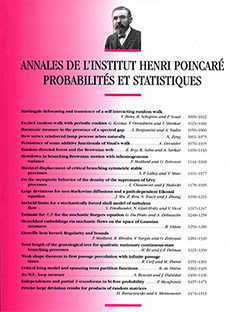Abstract
In the present work, we consider spectrally positive Lévy processes $(X_{t},t\geq0)$ not drifting to $+\infty$ and we are interested in conditioning these processes to reach arbitrarily large heights (in the sense of the height process associated with $X$) before hitting $0$.
This way we obtain a new conditioning of Lévy processes to stay positive. The (honest) law ${\mathbb{P}}_{x}^{\star}$ of this conditioned process (starting at $x>0$) is defined as a Doob $h$-transform via a martingale. For Lévy processes with infinite variation paths, this martingale is $(\int\tilde{\rho}_{t}(\mathrm{d}z)\mathrm{e}^{{\alpha}{z}}+I_{t})\mathbf{1} _{\{t\leq T_{0}\}}$ for some $\alpha$ and where $(I_{t},t\geq0)$ is the past infimum process of $X$, where $(\tilde{\rho}_{t},t\geq0)$ is the so-called exploration process defined in [10] and where $T_{0}$ is the hitting time of 0 for $X$. Under ${\mathbb{P}}_{x}^{\star}$, we also obtain a path decomposition of $X$ at its minimum, which enables us to prove the convergence of ${\mathbb{P}}_{x}^{\star}$ as $x\to0$.
When the process $X$ is a compensated compound Poisson process, the previous martingale is defined through the jumps of the future infimum process of $X$. The computations are easier in this case because $X$ can be viewed as the contour process of a (sub)critical splitting tree. We also can give an alternative characterization of our conditioned process in the vein of spine decompositions.
Dans ce travail, on considère des processus de Lévy $(X_{t},t\geq0)$ ne dérivant pas vers $+\infty$ et on s’intéresse à leur conditionnement à atteindre des hauteurs arbitrairement grandes (au sens du processus des hauteurs associé à $X$) avant de toucher $0$.
On obtient ainsi une nouvelle manière de conditionner des processus de Lévy à rester positifs. La loi (honnête) ${\mathbb{P}}_{x}^{\star}$ de ce processus conditionné (partant de $x>0$) est définie selon une $h$-transformée de Doob à l’aide d’une martingale. En ce qui concerne les processus de Lévy ayant des trajectoires à variation infinie, cette martingale est $(\int\tilde{\rho}_{t}(\mathrm{d}z)\mathrm{e}^{\alpha z}+I_{t})\mathbf{1} _{\{t\leq T_{0}\}}$ pour un certain $\alpha$ et où $(I_{t},t\geq0)$ est le processus infimum de $X$, où $(\tilde{\rho}_{t},t\geq0)$ est le processus d’exploration défini dans [10] et où $T_{0}$ est le temps d’atteinte de 0 par $X$. Sous ${\mathbb{P}}_{x}^{\star}$, on obtient également une décomposition de la trajectoire de $X$ en son minimum; ce qui permet de prouver la convergence de ${\mathbb{P}}_{x}^{\star}$ quand $x\to0$.
Lorsque le processus $X$ est un processus de Poisson composé compensé, la martingale est définie à partir des sauts du processus infimum futur de $X$. Les preuves sont plus simples dans ce cas puisque on peut voir $X$ comme le processus de contour d’un arbre de ramification (sous)critique. Dans ce cas, on énonce aussi une caractérisation alternative du processus conditionné dans l’esprit des décompositions spinales.
Citation
Mathieu Richard. "Lévy processes conditioned on having a large height process." Ann. Inst. H. Poincaré Probab. Statist. 49 (4) 982 - 1013, November 2013. https://doi.org/10.1214/12-AIHP491
Information





